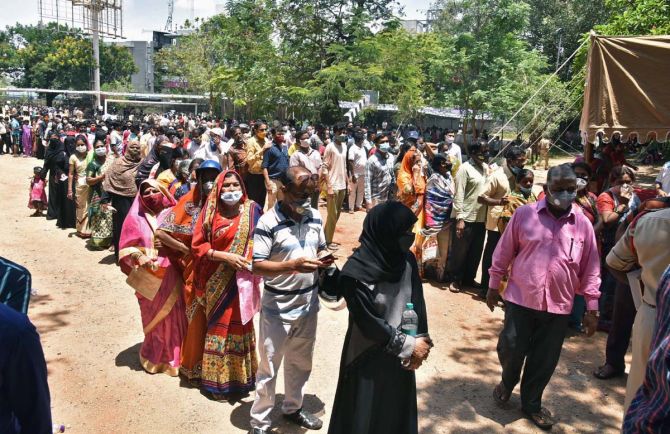Unless public health is prioritised over swift re-opening, the chances are that a third wave will hit India sooner than we would like, asserts Mihir S Sharma.

It is now conventional wisdom that the devastating second wave of the pandemic in India has retreated somewhat, particularly in cities like Delhi.
New cases have fallen steadily since the beginning of May, although testing has continued to rise and are now comfortably over 2 million tests a day. Almost all states are showing a decline now.
It is worth noting that the number of confirmed cases is still well above those recorded at the peak of the first wave, so it would be a terrible idea to open up quickly.
Unless public health is prioritised over swift re-opening, the chances are that a third wave will hit India sooner than we would like. This is the context in which we should read the recent numbers on gross domestic product growth in India over 2020-2021, which showed a quicker than expected rebound in the fourth quarter of the year.
There is a direct link between the speed of that rebound and the severity of the second wave. The government must thus stop talking about a 'V-shaped recovery' until such time as their best scientific advice assures them that a resumption of "normal" economic activity is compatible with control of the virus' spread.

Two points thus need immediate consideration.
The first is what the government, at both Union and state levels, may have learned over the past year about ensuring welfare reaches those most vulnerable to pandemic-related restrictions.
Some important steps forward have been taken in this respect over the past year, such as 'one nation, one ration card"\'. It is of utmost urgency that the government swiftly examine the effectiveness of these changes.
Recent work by Jean Dreze and Anmol Somanchi collating surveys of food insecurity during last year's lockdown has shown that between 50 and 80 per cent of households surveyed were eating less than before.
What has the government learned from this crisis?
What additional mechanisms for food security -- hot food canteens, for example -- can be put into place immediately?
The government should have answers for these questions.

The second point is that restrictions can only be lifted when the vaccination campaign reaches certain pre-set levels of success.
The original target to vaccinate 300 million Indians by the end of the monsoon may or may not be achieved. But what is necessary now is a clear roadmap linking vaccines delivered to reopening, which cannot be left to arbitrary and unscientific decision-making.
Any obstacle that gets in the way of more vaccines being delivered should be removed.
Such obstacles include, but are not limited to, the reported demand from some vaccine companies that they be indemnified. Given recent reports on frivolous litigation, this is a reasonable demand and should be met.
It may be particularly important to get mRNA-based vaccines out as booster shots since they appear more effective against the B.1617.2 variant, now being called the Delta variant.
Government must also recognise that vaccine hesitancy is a problem. The answer to such hesitancy is to ensure that there is utmost transparency and science-based regulation, alongside a public information campaign.

Some officials in the Union government, alongside the ruling party's foot soldiers in their online war, have meretriciously claimed questions that were asked about speedy authorisation for Bharat Biotech's Covaxin are responsible for the government's own failure in the vaccine rollout. This is an appalling argument. The truth is precisely the reverse.
Hasty approvals for Covaxin prior to sufficient Phase 3 data being available was the problem.
It is the government that is responsible for any vaccine hesitancy, not those -- both in and out of the political Opposition -- who asked the right questions about Covaxin when it was first granted authorisation.
We know this is a political ploy for if the government was serious about vaccine hesitancy being a problem, it would have instead taken on public figures with a commercial interest in untested pseudoscientific products who are busy attacking modern medicine and vaccines day in and day out.

Government must also now shift emphasis from making vaccines available to those who come to vaccine centres to taking vaccines to those most vulnerable.
Those above 60, in particular, must be sought out and delivered the vaccine. Some recent remarks by both politicians and judges suggest that vaccine distribution must prioritise younger people. There is no reasonable public health rationale for this, given mortality rates increase rapidly with age.
The next stage of the vaccination programme must prioritise making it ever easier for those above 60, then those above 45, to receive the vaccine.
Noise to the contrary from the Opposition or state government must be ignored as scientifically unsound.
Finally, the government must move on an international level towards demanding that the origins of COVID-19 be thoroughly probed.
An accumulation of circumstantial evidence over the past six to eight months has raised the theory that it may have leaked from a laboratory from a fringe idea to one requiring serious investigation.
An open investigation of this possibility must underlie India's efforts in the multilateral domain going forward.
Feature Presentation: Ashish Narsale/Rediff.com












 © 2025
© 2025